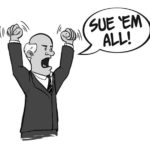ONE LAWSUIT Filed a Week in Federal Court. Students Accused Suing Colleges/Universities.
The former Purdue University undergraduate called it a “Kafkaesque process.” Only identified as John Doe, the one-time Boilermaker was accused of and ultimately found responsible by the university for sexually assaulting his former girlfriend. He has continually denied the allegations, but after an investigatory procedure that he claims violated his due process rights and discriminated against him because he is male, he was suspended from the university for one year and had to involuntarily resign from the Navy ROTC. Doe then turned to the federal courts for relief. Doe claimed the process that found him responsible did not have a hearing of any kind. There was no cross-examination, no sworn testimony. He was not allowed to see the investigators’ report and was not allowed to provide evidence that supported his side of the story. Rather, he asserted, “there was no presumption of innocence but rather a presumption that the accusing female’s story was true.” After the U.S. District Court for the Northern District of Indiana dismissed his complaint, he pressed forward. Last month, the 7th Circuit Court of Appeals heard oral arguments in John Doe v. Purdue University.
The number of these kinds of lawsuits is rising nationwide. Brooklyn College history professor KC Johnson has become a critic of how universities are handling allegations of sexual misconduct. In general, Johnson said, schools have established procedures that incorporate no meaningful investigation and do not provide any way for the accused to defend themselves. As evidence, he pointed to the increase in lawsuits. According to his records, an average of one lawsuit has been filed every week in federal court by an accused student for the last 2-1/2 years. Most of the lawsuits end in settlements because, he said, universities do not want to go through the discovery process and a trial. The rise in these cases is linked to the 2011 “Dear Colleague letter” issued by the U.S. Department of Education under the Obama administration… Johnson noted the most unusual aspect of the Purdue case was that the accuser did not appear before the university’s three-member advisory panel. Rather, the accuser submitted a statement that had actually been written by the school’s Title IX coordinator and director of the Center for Advocacy, Response and Education.
ibj.com By Marilyn Odendah

